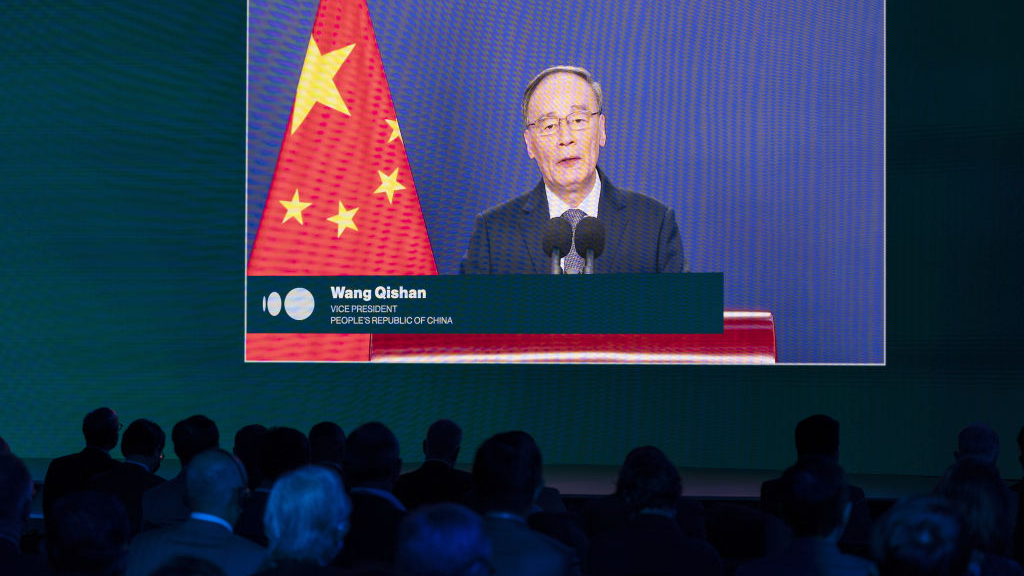
The skyline in Shanghai. /Getty
The skyline in Shanghai. /Getty
Editor's note: Hannan Hussain is a foreign affairs commentator and author. He is a Fulbright recipient at the University of Maryland, the U.S., and a former assistant researcher at the Islamabad Policy Research Institute. The article reflects the author's opinions and not necessarily the views of CGTN.
Delivering his address at the 2021 Bloomberg New Economy Forum in Singapore, Chinese Vice President Wang Qishan couldn't have struck a more vital note on the nature of economic momentum needed to secure lasting market reforms at the world stage. "Going forward, China will keep its arms wide open, provide more market investment and growth opportunities to the world, and contribute its part to the building of a noble world economy and a community with a shared future for mankind," said Wang at the forum on November 17.
This nuanced call to encourage supply-side leadership of foreign investments, particularly in the face of rising trade barriers in the name of national security, finds a potent example in China's own domestic offerings to the world. China's new development philosophy, for instance, was a bold reference point in navigating the perils of a pandemic that continues to cloud economic gains and positive growth forecasts in several corridors of the world.
Consider takeaways from JPMorgan's October market insights on what the world can learn from China's synthesis of domestic and international market expectations. The October insights suggest China's healthy global revenue exposure when viewed in conjunction with the recent investment-focused regulation measures across six sectors, all geared towards a single promise: to export that stability blueprint externally for the shared benefit of the global economy.
"China cannot develop in isolation from the world and nor can the world develop without China," Wang noted. To keep scores of recovering economies in Asia and beyond from being bogged down by macroeconomic slowdowns, long-term thinking must align with such time-tested economic foresight.

China's Vice President Wang Qishan speaks virtually during the Bloomberg New Economy Forum in Singapore, November 17, 2021. /Getty
China's Vice President Wang Qishan speaks virtually during the Bloomberg New Economy Forum in Singapore, November 17, 2021. /Getty
No doubt surrounds the fact that optimism on overcoming trade barriers and opening up markets is a glaring performance benchmark in itself, but to assure nations that consequential relationships such as U.S.-China trade ties could diversify less integrated economies in sync, a fair degree of great power diplomacy becomes necessary. To that end, Wang's reading of U.S.-China ties as such that could "manage and control [their] differences" based on a shared pursuit for cooperation, should be a wake-up call for skeptics that presume the relationship is unquestionably tailored to serve zero-sum constructs of trade escalations. Those toxic speculations, just like the triple perils of protectionism, vaccine nationalism and foreign investment barriers, are cast aside once rapidly developing economies begin to rally support for fair and equitable standards to support economic progression overseas. China is making its case loud and clear.
Wang's address also communicated the Chinese government's demonstrated commitment to framing global market reforms as the need of the hour. An indicator in Wang's address was to render talk on "low-carbon transition" as such that extends the transition's tangible merits to other nations, many of which emerge at very distinct development stages.
Similarly, the world needs a concerted attempt to close global ranks behind the COVID-19 pandemic, by sending a powerful message on what China itself recognizes is growth born at the intersections of health interventions and custom capacity for market reform. Wang reminds the world of sensitizing the global economic recovery discourse to what fellow countries deem as "fair and equitable distribution" of COVID-19 vaccine supplies to support growth environments to the benefit of people and leaderships alike.
Skeptics of cooperation must answer this question: Is ignoring the climate and health contours of global economic recovery a step towards challenges of the past decade, or a pivot towards the opportunities of the next? That question, which in Wang's informed assessment on Wednesday, is barely answered by the onset of "protectionism, unilateralism and the backlash against economic globalization." Nations must cut through these uncertainties by striving for a climate of resilience suited to global economic progression, not the politics of that progression itself.
Ultimately, Wang's message for China to serve as a catalyst economy for global investment gains goes hand in hand with Beijing's unwavering commitment to addressing climate, health and security concerns of each and every state vying for a peaceful future. In his telling, a model of "open, inclusive, balanced and beneficial" economic globalization is what the future must consolidate.
(If you want to contribute and have specific expertise, please contact us at opinions@cgtn.com.)

